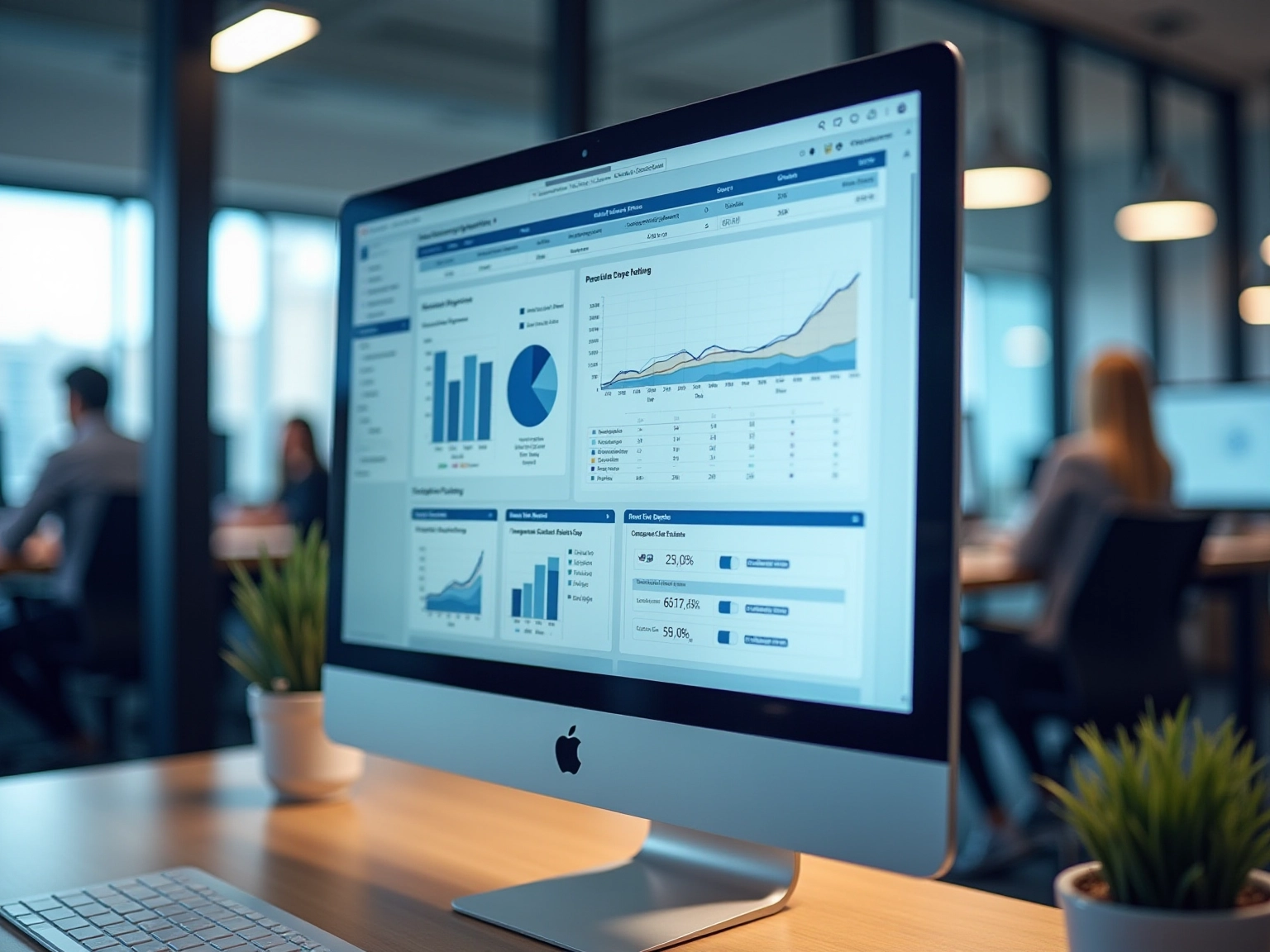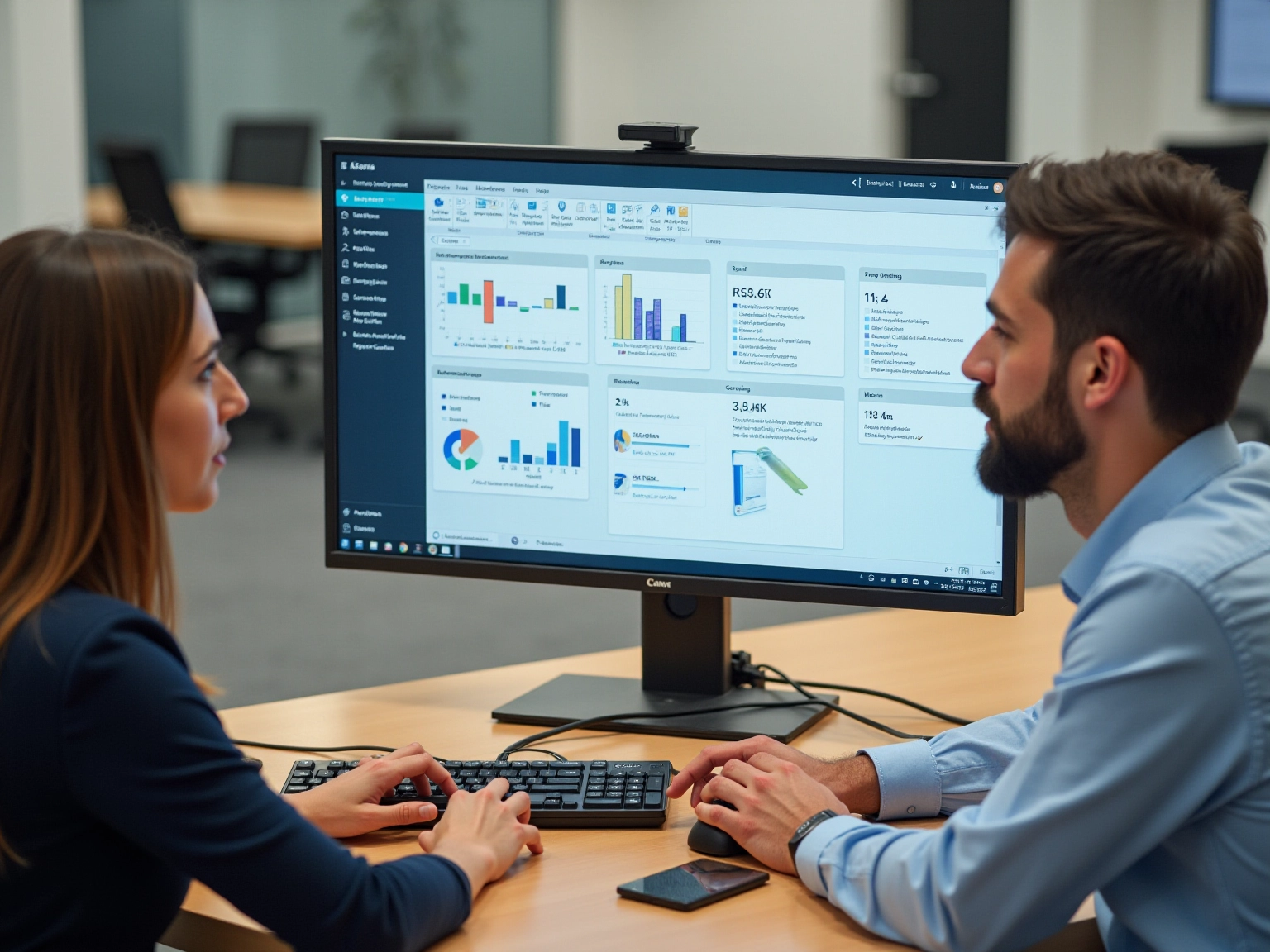Overview
When selecting accounting software equipped with project management features, it is essential to concentrate on pivotal elements such as:
- Centralised data management
- Real-time reporting
- Budget monitoring
- The ability to integrate seamlessly with existing tools
These features are not merely enhancements; they are critical components that empower decision-making, elevate efficiency, and foster superior collaboration. Ultimately, this leads to substantial time savings and enriched client interactions, positioning your organisation for success in today’s competitive landscape.
Key Highlights:
- Accounting software with project management provides a centralized platform for monitoring financial information, aiding in budget, expense, and revenue tracking.
- Centralized data management improves decision-making and reduces errors by storing all project-related financial data in one place.
- Real-time reporting features offer instant insights into financials, enabling prompt adjustments and strategic planning.
- Budget monitoring tools help avoid overspending and maintain financial viability, with automated notifications for task management.
- Integration with other tools enhances workflows and collaboration, with APIs allowing for seamless connections to existing systems.
- Companies using advanced accounting solutions report significant efficiency gains, such as increased client response rates and reduced response times.
- Key features for effective project management include task management, time tracking, budgeting tools, reporting, and collaboration tools.
- To assess software options, create a comparison matrix, evaluate pricing models, read user reviews, request demos, and check for scalability.
- User experience is critical; choose software with an intuitive interface, comprehensive training resources, and responsive customer support.
- Evaluate integration capabilities with existing systems to ensure smooth data transfer and operational efficiency.
Introduction
In the dynamic landscape of project management, the integration of accounting software stands as a transformative force, offering a cohesive platform for managing financial data throughout project lifecycles. By centralising budget tracking, expense monitoring, and real-time reporting, these tools empower organisations to make informed decisions and sustain financial health.
As firms increasingly acknowledge the critical role of technology in enhancing efficiency, understanding the essential features and integration capabilities of accounting software becomes crucial.
This exploration delves into the vital aspects that not only streamline project management but also foster improved collaboration and client engagement, ultimately revolutionising how businesses operate in an ever-evolving marketplace.
Understand the Role of Accounting Software in Project Management
Accounting software with project management is essential for efficient oversight, as it provides a centralised platform for monitoring financial information related to initiatives. This capability empowers accountants and managers to track budgets, expenses, and revenues in real-time, ensuring financial viability throughout the lifecycle. To maximise the benefits of accounting software with project management in managing initiatives, consider the following key aspects:
- Centralised Data Management: All project-related financial data should be stored in a single location, streamlining access and analysis. This centralisation enhances decision-making and minimises the risk of errors. With this system, all correspondence is contained within each audit request, ensuring that responses cannot be misplaced or overlooked in busy inboxes, unlike traditional email communication.
- Real-Time Reporting: Opt for applications that offer real-time reporting features, providing instant insights into financials related to the endeavour. The company presents a visual progress report, allowing accountants to view pending requests and inquiries, which is crucial for prompt adjustments and informed strategic planning.
- Budget Monitoring: The application must facilitate budget formulation and tracking, helping to avoid overspending and ensuring initiatives remain within financial limits. Effective budget oversight is vital for sustaining profitability in initiatives, and the platform enhances this by automating notifications and monitoring tasks, thereby encouraging prompt replies from clients.
- Integration with Other Tools: Select applications that seamlessly connect with task coordination tools, improving workflows and fostering collaboration among team members. The company provides an open API for close integration into existing systems, enhancing overall efficiency and communication, highlighting the importance of choosing the right accounting software with project management capabilities. Companies utilising advanced accounting solutions, such as Glasscubes, have reported substantial advantages, including a 40% increase in client response rates and a 50% reduction in response times, illustrating the impact of technology on financial tracking for initiatives. Furthermore, as highlighted by Sophie Montgomery from TaxAssist Accountants, users can save considerable time, with reports of 288 hours saved in a single tax season, emphasising the efficiency improvements from centralised data handling and real-time reporting. Notably, 85% of accountants believe that technology adoption is essential for competitiveness, underscoring the urgency for firms to embrace these advancements.

Identify Key Features for Effective Project Management
When selecting accounting software with project management capabilities, recognising essential attributes that enhance workflow is crucial. Consider these critical elements:
- Task Management: The ability to create, assign, and track tasks is vital for maintaining project schedules and ensuring accountability. Glasscubes offers robust task management tools that empower teams to manage workflows effectively.
- Time Tracking: Opt for software that enables team members to log hours worked on specific tasks, facilitating accurate billing and resource allocation.
- Budgeting Tools: Efficient budgeting instruments are essential for planning costs and monitoring expenses against the budget, ensuring financial control.
- Reporting and Analytics: Comprehensive reporting features enable the analysis of project performance, fostering data-driven decision-making that can significantly enhance outcomes. With this platform, you can access real-time reporting on the status and progress of all requests, thereby enhancing transparency and accountability.
- Collaboration Tools: Features that support team collaboration, such as shared calendars and document organisation systems, improve communication and overall efficiency. This company provides secure file sharing and a customised client portal solution, enabling seamless collaboration with clients while branding the platform as your own.
Adopting organised task coordination strategies can result in initiatives being 2.5 times more successful. By concentrating on these essential attributes, you can ensure that the accounting software with project management you select effectively assists your task oversight requirements, ultimately leading to enhanced client interaction and operational effectiveness. Furthermore, as 85% of CEOs express confidence in AI’s ability to improve task organisation efficiency, integrating advanced application features such as automated reminders from Glasscubes can provide a competitive edge. The automated reminder feature allows users to send an unlimited number of reminders with customisable messages, ensuring timely follow-ups and improved client communication. For instance, Evolution Accounting & Consulting, LLC successfully implemented task coordination capabilities to enhance their processes, demonstrating the practical advantages of these features in real-world scenarios.

Evaluate and Compare Software Options
To effectively assess and compare accounting software with project management capabilities, consider the following steps:
-
Create a Comparison Matrix: Compile a list of potential applications alongside their key features. This visual representation highlights differences and aids in decision-making.
-
Assess Pricing Models: Examine the pricing structures of each application, including subscription fees, setup costs, and any additional charges for extra features. Understanding the total cost of ownership is crucial for budgeting. For instance, Glasscubes offers various plans, such as the Essential plan at £120 per month and the Professional plan at £180 per month, which include features like automated reminders and secure file sharing.
-
Read User Reviews: Gather feedback from current users to assess satisfaction levels and identify common issues. User testimonials, such as Sophie Montgomery’s experience at TaxAssist Accountants, where she noted an impressive 288 hours saved in just one tax season, provide valuable insights into the programme’s performance and reliability.
-
Request Demos: Utilise free trials or demonstrations to experience the application firsthand. This hands-on approach allows you to evaluate usability and determine if it meets your firm’s specific needs. For example, this platform offers a demonstration that highlights its client portal, promoting collaboration and document approval, thus improving client engagement and response rates.
-
Check for Scalability: Ensure that the application can grow with your firm, accommodating more users or additional features as your business expands. Scalability is essential for long-term viability. The platform supports this with options for unlimited storage and user licences, making it adaptable to your firm’s evolving needs.
Additionally, consider key factors such as responsiveness, expertise, and accessibility when selecting an accounting service provider. Companies that have embraced integrated solutions like Glasscubes have indicated a 50% decrease in response times, highlighting the efficiency improvements achievable with the appropriate tools. Furthermore, the use of accounting software with project management, along with automated workflows and secure file sharing, can minimise human errors and conserve time, rendering these features essential in your assessment process. By methodically reviewing these factors, you can arrive at a knowledgeable decision that aligns with your firm’s task coordination and accounting needs.
Consider User Experience and Support Services
When selecting accounting software with project management, it is essential to focus on user experience and support services to maximise efficiency and satisfaction.
User Interface: Opt for a programme that boasts an intuitive and user friendly interface, significantly reducing the learning curve for your team. Glasscubes, for instance, is consistently praised for its simple navigation and user-friendliness, allowing users to effortlessly manage their tasks. As Annemarie Bufe, a Content Manager, notes, “It takes less than 500ms, or even just 50ms, to make a good first impression.” A well-crafted interface can boost productivity, enabling users to navigate the application seamlessly.
Training Resources: Ensure that the provider offers extensive training materials, including tutorials, webinars, and comprehensive documentation. The company excels in this area by providing a seamless onboarding experience where their team manages the initial setup, ensuring that your team can quickly adapt to the platform. Investing in training is crucial; a study shows that 90% of HR managers believe that training benefits employee productivity and development. Effective training materials guarantee that your team can fully utilise the application’s features, ultimately leading to enhanced productivity and retention.
Customer Support: Evaluate the availability and responsiveness of customer support options, such as live chat, phone support, and email assistance. The company is recognised for its exceptional customer support, with prompt responses to queries during the setup process and ongoing assistance. Reliable customer support is vital for addressing issues promptly, preventing disruptions in workflow.
Community and Forums: Investigate whether there is an active user community or forums where you can seek advice and share experiences with other users. Engaging with a community can provide valuable insights and foster collaboration among users facing similar challenges.
Feedback Mechanisms: Choose software that incorporates user feedback mechanisms for continuous improvement. The platform enables users to provide feedback, ensuring that the tool evolves according to user requirements, boosting overall contentment and efficiency.
Key Features: Seek specific features that enhance client engagement, such as automated client email reminders and unlimited information storage capabilities. The company provides automated reminders that can be tailored for urgency and frequency, ensuring timely communication with clients. Furthermore, there are no limits on the amount of information you can store in the portal, offering flexibility and ease of access.
By prioritising these aspects of user experience and support, you can significantly enhance your team’s productivity and satisfaction with the accounting software with project management. Additionally, consider the financial impact of training; organisations that invest in employee training often see substantial improvements in productivity and retention, reinforcing the importance of these resources. To experience these benefits firsthand, take advantage of Glasscubes’ 30-day free trial and schedule a demo to discover how it can transform your accounting processes.

Assess Integration Capabilities with Existing Systems
To maximise the benefits of your accounting software with project management through enhanced coordination features, it is essential to thoroughly evaluate its integration capabilities with existing systems.
- Identify Existing Tools: Begin by compiling a comprehensive list of the programmes and tools currently employed by your firm, including CRM systems, payroll applications, and project management solutions.
- Cheque Compatibility: Investigate whether the accounting software with project management can seamlessly integrate with these existing systems, either through native support or third-party connectors. For operational efficiency, using accounting software with project management is vital.
- Evaluate API Availability: Prioritise accounting software with project management that provides an API (Application Programming Interface) for custom integrations, offering greater flexibility and adaptability to your firm’s unique requirements.
- Consider accounting software with project management: Ensure that the application facilitates smooth data transfer from your existing systems, protecting against data loss or corruption during the transition.
- Test Integration Functionality: Whenever feasible, conduct practical tests to assess how well the accounting software with project management integrates with your current tools, focusing on data flow and synchronisation to ensure a cohesive operational environment.
Thoroughly assessing integration capabilities not only streamlines the transition process but also enhances overall operational efficiency, making it essential for organisations that prioritise accounting software with project management to meet client demands. For accounting firms, utilising accounting software with project management that ensures compatibility with existing tools significantly reduces the risk of disruptions and improves workflow, ultimately leading to enhanced client service and satisfaction.

Conclusion
The integration of accounting software into project management has emerged as a transformative force for organisations aiming for enhanced efficiency and robust financial health. By centralising data management, offering real-time reporting, and enabling seamless budget tracking, these tools empower project managers and accountants to make informed decisions that significantly bolster project viability. Notably, features such as task management, collaboration tools, and comprehensive analytics not only streamline workflows but also markedly elevate client engagement.
Furthermore, the significance of user experience and support services is paramount. An intuitive interface, extensive training resources, and responsive customer support are critical for unlocking the software’s full potential. Firms that emphasise these elements can anticipate heightened productivity and satisfaction among their teams, ultimately culminating in superior project outcomes.
As the demand for technology-driven solutions escalates, the capacity to evaluate and compare software options based on features, cost, and integration capabilities will distinguish successful firms in the marketplace. By adopting advanced accounting software that aligns with project management requirements, organisations can enhance their operational efficiency while adapting to the evolving needs of their clients. The future of project management hinges on the strategic implementation of these tools, representing a crucial step towards sustained success in an increasingly competitive landscape.
